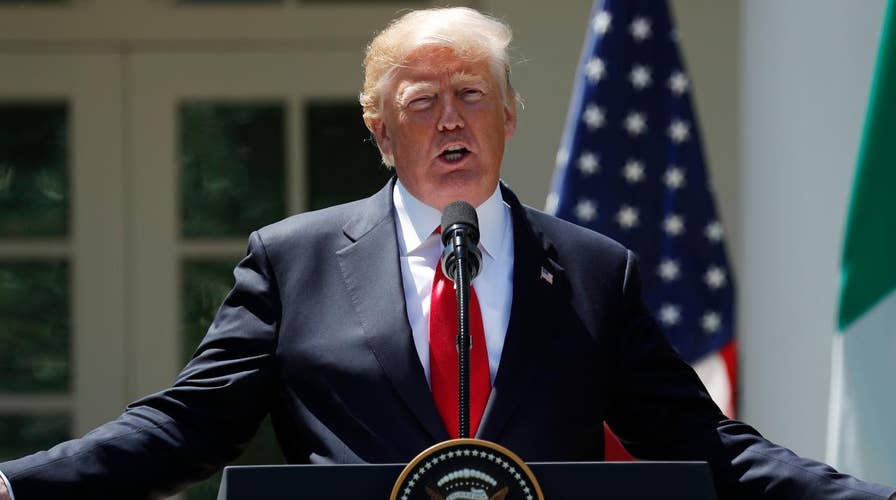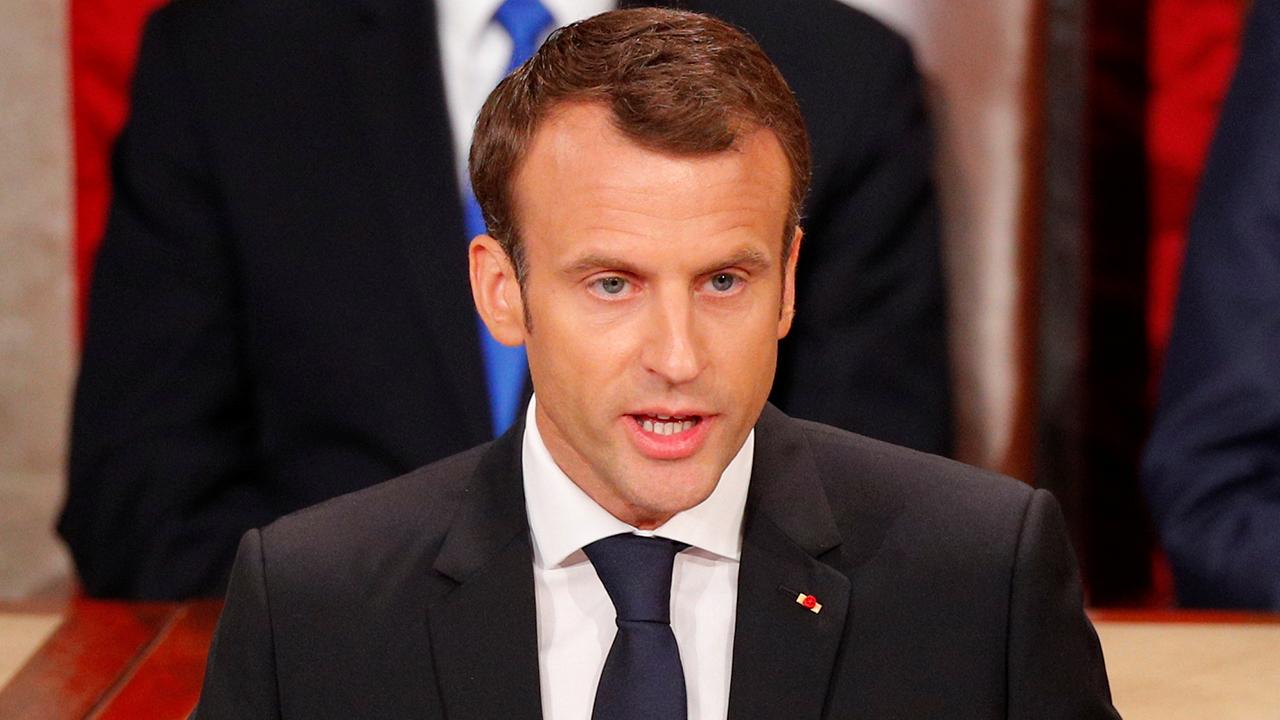Trump: I've been 100 percent right on Iran nuclear deal
President Trump comments on Israeli Prime Minister Netanyahu's presentation, says the U.S. 'got nothing' from the nuclear deal with Iran and signals openness to negotiating new agreement.
President Trump is widely expected to withdraw from the Iran nuclear deal by May 12 – but in reality, the deeply flawed deal was likely doomed and headed for the junkyard of history from the moment he placed his hand on the Bible to take the oath of office as president on Jan. 20, 2017.
Israeli Prime Minister Benjamin Netanyahu’s briefing Monday on Iran’s extensive nuclear program – documenting how the 2015 nuclear deal that was designed to prevent Iran from developing nuclear weapons was “based on lies” – was one more piece of evidence justifying President Trump’s virtually certain decision to kill from the deal.
In addition to the U.S. and Iran, other world powers that are parties to the agreement are the European Union, Britain, France, Germany, Russia and China.
French President Emmanuel Macron is desperately trying to save the deal – and address some of its gaping holes – along with British and German leaders. They are suggesting side agreements to keep the existing framework in place.
However, Trump administration officials argue that, in many respects, America’s European allies are making the argument for killing the deal for them.
“France and Germany are making the case for us that this deal needs to die,” a Trump administration official who asked not to be identified so he could speak candidly told me Tuesday. “Why is Europe so desperate to keep this bad deal going? With all its problems, it makes sense to scrap it and negotiate something much more comprehensive … and really fix the problem once and for all. We don’t need a Band-Aid agreement with Iran – we need something that delivers a solution to their nuclear aims. There is no point in anything less than that.”
The flaws in the agreement – negotiated by the Obama administration and the other nations involved – were described to me by Trump administration officials and others.
The biggest flaw is that the agreement only holds back Iran’s nuclear weapons aspirations for about a decade. This so-called sunset provision is the one of the most worrisome flaws of the deal, a defect that has given many Israeli defense officials I have spoken to over the years countless headaches.
Israel is a tiny country – the United States is 473 times larger. So the Jewish state has good reason to fear that Iran, which has pledged many times to destroy Israel, could actually do so if it developed nuclear weapons and used them to attack.
“The Iran deal is garbage because it is dead in 10 to 12 years,” a senior Israeli official told me. “It should be tossed for that reason alone. It provides no concrete solution to the nuclear question that hangs over the Middle East – and remains an existential threat to Israel.”
The Israeli official added: “Iran’s nuclear know-how is just being kept on ice. They most surely retained all their prior work to build a nuclear weapon. Mark my words, in 10 years or so, they won’t want to renegotiate the deal or create a permeant one. By then, they will have the means to quickly build a nuclear weapon – and have the delivery systems to accurately hit Israel, Europe and possibly even America.”
Speaking of delivery systems, that is the second and one of the most challenging problems with the Iran deal. The Islamic Republic can still develop any type of missile with no restrictions on range or payload whatsoever. And it would be those very cruise and ballistic missiles that Tehran would use to launch nuclear weapons.
“People underestimate what a problem that is,” a top defense official in the George W. Bush administration told me. “Iran can pour lots of money into building advanced long-range missiles – or even buy ICBM technology from North Korea – and when the deal expires, mount their nuclear weapon onto a missile that is essentially ready to go. The Obama administration should have never signed this deal … it is a fatal flaw that should have ended any talk of this agreement. It makes the deal not even worth the paper it was signed on. Disgraceful.”
But perhaps the worst problem with the Iran deal is that it was never going to change the nature of the Iranian regime. From Syria, to Iraq, to Yemen the mullahs who rule Iran are spreading chaos and death all over the Middle East, while expanding their own power and influence.
Obama administration officials naively hoped that Iran – free of international economic sanctions after signing the nuclear deal – would become a peaceful member of the community of nations. But Iran has shown beyond doubt that is has no intention of changing its behavior.
So with the Iran deal likely to be declared officially dead by President Trump in the next few days, what happens next?
The Trump administration must focus on how to contain Iranian aspirations in the Middle East, while, at the same time trying to forge what could be a new agreement with Tehran. But past and present U.S. government officials and experts are in near universal agreement that none of that will be easy.
Hatred of the “Great Satan” America and of the “Zionist entity” of Israel are core beliefs of the current Iranian regime.
“The Trump administration has the right idea – it’s time to confront Tehran now before they become too powerful, have missiles they can mate with warheads or becomes an economic powerhouse,” a former Israeli diplomat told me. “But they (U.S. officials) must lay out their vision of how they want to accomplish it, what their goals are and how they will achieve their objectives.”
The former Israeli diplomat added: “Otherwise, all of this will be for nothing – and Iran is then free from its nuclear prison. We are rooting for President Trump, but we want a comprehensive strategy to tackle this problem.”
A European diplomat told me that everyone with a vested interest in a stronger Iran deal knows “what that blueprint looks like.”
“Iran must agree to limit on its missile capabilities, the complete ending of its nuclear weapons program forever, along with a dramatic curtailing of its support of terrorism throughout the Middle East and causing trouble in various nations throughout the region,” the European diplomat said. “That is the deal. Anything else and we are wasting our time.”
And if not?
“Iran can be contained,” the former official from the George W. Bush administration said. “We have done it before, we can do it again. There is no shame in such a plan. Their economy can be held back in isolation for years – perhaps decades. They won’t be able to get rich selling oil or gas. They can go back to being an international pariah. And, considering Iran’s recent economic and protest issues, that should scare the hell out of them.”
Might cancelling the Iran deal cause so many problems for the country that it could lead to regime change? No one can say for sure, but in 1979 a revolution overthrew an Iranian government that was friendly to the U.S. and did not threaten Israel. We can’t rule out another revolution in the years ahead that will knock the current Islamist extremist regime out of power.


